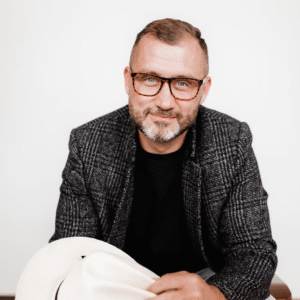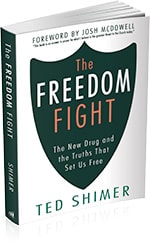I’ve heard it said, “Margin is what’s left when your load intersects with your limits.” Today, men have razor-thin margins. Why? Because we carry a heavy load.
In 1939, Al Huxley wrote A Brave New World—a dystopian novel—Huxley envisioned a future not of dictatorship but of distraction. He noted that hurriedness, addiction, and distraction would ruin our world.
Huxley proved to be a very capable prophet. Distraction may be the heaviest load of all.
We are more distracted and weighed down than ever before. The culprit behind our heaviness? Our devices. Phones. Screens. Streaming. Always on and always robbing us of who we are meant to be. Felicia Wu Sung writes,
“Indeed, what we have discovered in our digitally saturated society is that we have a remarkable endurance and capacity to remain attuned to our devices—it is the first thing we greet in the morning and it is the last thing we take into bed with us at night. In between meetings and activities, at any given pause whether we are standing in line or sitting in wait, we diligently tend to our devices. Why? Because we are waiting and searching for joy, for satisfaction, for purpose, for love. We are waiting and therefore abiding in the digital…” [Book, Restless Devices]
Like a digital vine, the iWorld says, “Abide in me… find rest for your souls…” So that is where we go. When bored, we look down [on average, we attend to our phones 144x per day].
Waiting at a red light. Waiting for our food. Waiting for the meeting to start. Waiting in line. Waiting for our kids to put their shoes on. Waiting for intermission to be over. Waiting feels like a disease, so we avoid it. Instead of waiting, we look at our phones, thinking that they will satisfy us when, in reality, they always demand more from us. It’s a damnable thing to love something so much that can’t, and won’t, ever love you back.
Wu Sung continues,
“When our minds are preoccupied with something “productive,” the areas of the brain that specialize in our capacities to process autobiographical memory, craft a coherent sense of self, and imagine how others are feeling are all muted…. The more we demand our brains to attend to being productive, the less our brains are able to grow us as persons in key areas of identity construction and empathy.”
Did you catch that? The distraction mutes our ability to craft our story, discover our identity, and care for others. Is it any wonder most men today are characterized as lost, insecure, and selfish? We’ve done it to ourselves. Like Linus’ blue blanket, the device becomes our identity, it becomes our security.
Psalm 16
Psalm 16 is about security—it is a prayer for security. It was written almost 3,000 years ago by King David. David prays,
“Preserve me, O God, for in you I take refuge. I say to the Lord, ‘You are my Lord; I have no good apart from you.’ The sorrows of those who run after another god shall multiply; their drink offerings of blood I will not pour out or take their names on my lips.
The Lord is my chosen portion and my cup; you hold my lot. The lines have fallen for me in pleasant places; indeed, I have a beautiful inheritance.
I bless the Lord who gives me counsel; in the night also my heart instructs me. I have set the Lord always before me; because he is at my right hand, I shall not be shaken.
Therefore my heart is glad, and my whole being rejoices; my flesh also dwells secure. For you will not abandon my soul to Sheol, or let your holy one see corruption.
You make known to me the path of life; in your presence, there is fullness of joy; at your right hand are pleasures forevermore.”
Sadness and Sorrow
David tells us, “The sorrows of those who run after another god shall multiply…” When we run after something [or turn to something] that is not God, our sorrows will multiply.
Sadness and sorrow will multiply. Sound familiar?
Join the Resistance
How do we resist the shattering of our attention and the pursuit of security in the digital vine? How do we supplant sadness and sorrow with gladness and joy? We must recover the beauty of boredom.
No one likes to be bored, but giving our minds rest and space while turning our thoughts to Christ slowly repairs our anxious and overworked brains. By embracing boredom and looking to Christ, we discover who we are over and over again. By looking to Christ, we find the true source of our security—the true and only Vine.
We look down at our phones 144x a day. At best, if you’re “devoted,” you look to God and His Word, maybe 144x a year. When was the last time, you took time to think about eternal things? To ponder the supernatural? To look inward, and reflect? To praise God and thank Him for who He is and what He’s done?
Sadness and sorrow are multiplying. We’ve got to fight back. Where Do We Start?
Instead of letting our devices disciple us, we need to start discipling our devices. Consistency is greater than intensity—be consistent. Some practical starting points:
- Create a recurring schedule for when your phone will be powered down and put away. The Aro Box is VERY helpful here.
- Minimize the number of apps on your devices. If you haven’t opened an app in over a week, you don’t need it.
- Schedule a regular sabbath away from devices. I do this at least 1x monthly; I call them “desert days.”
- Establish limits for particular devices, apps, or media. Be specific, don’t say “less time on NetFlix,” establish a goal, e.g., “no more than 30 minutes a day…”
- Create “no device” zones, like the dinner table, the car, or while on a date with wifey.
- Develop best practices and guidelines for your children and family. Consider how your relationship with your devices affects your children’s relationship with theirs.
- Refuse to look at your phone before you spend time with God in the morning. Go analog on Bible reading so you are forced to face the text.
Wu Sung is right…
“We are waiting and therefore abiding in the digital.
What would it be like if we were to cultivate such a permanent state of expectancy for God’s desire to communicate with us?
What if my antennae were always outstretched toward checking in with God as much as I am always checking my smartphone?
What if I knew that there was a word that revealed God’s very nature . . . waiting just for me.
And that his nature was defined by a wild and faithful love that actually likes who I am, enjoys my company, and even takes delight in me. To be with someone who delights in you is a precious thing that we all long to experience. To live with the permission to be fully oneself, fearless because we know we are loved, not condemned or pegged as a sad-sack failure or disappointment.
This is what it is to hear from God.
But even beyond that sheer joy of being crowned with God’s delight, this notion of abiding also calls forth the idea of staying close to the Source of Life.
Staying in touch, not just within earshot but mindful and expectant—not because the Law demands it but in order to be in communion with the loving security of God, as expressed through the presence of the Holy Spirit.
This is the way, the truth, and the life.”
The next time you’re waiting, don’t turn to your phone. Redeem that time. Self-reflect. Make a new friend. Pray for an old friend. Look at something beautiful. Look at something ordinary. Be still and maybe you’ll hear from God.
Look inward.
Look upward.
Look around.
Look anywhere but down.
— Harp
___________________________________________________________________

Dr. Chris Harper (aka Harp) is passionate about biblical manhood, and often speaks on topics such as a man’s identity in Christ, the trouble and trials that threaten men, and the importance of being a gospel-centered husband and father. He is the CEO of BetterMan, an organization dedicated to providing biblical study resources and speakers for men and churches.
With a fiery and magnetic teaching style, Chris is sure to motivate and move his listeners.
Chris and his wife, Ally, live with their four children – Scarlett, Malachi, Calvin, and Oliver – in Arlington, Texas. In addition to his family, Chris loves music, a good cheeseburger, and firmly believes Jordan is better than Lebron.

